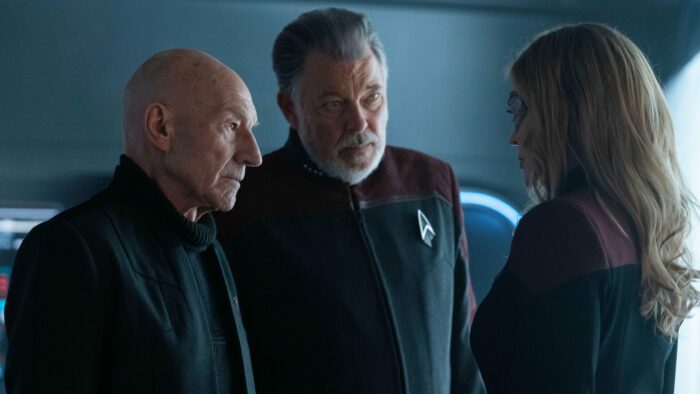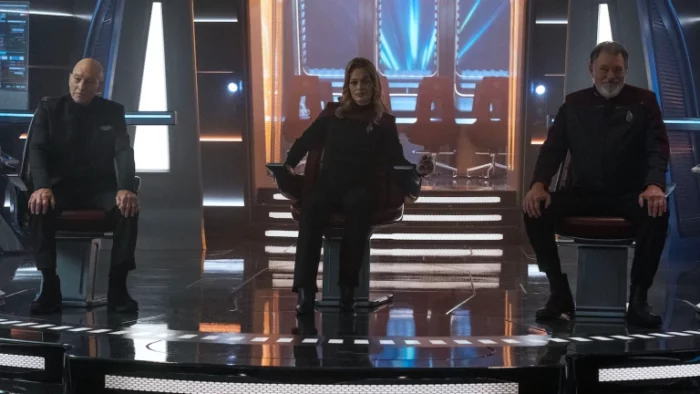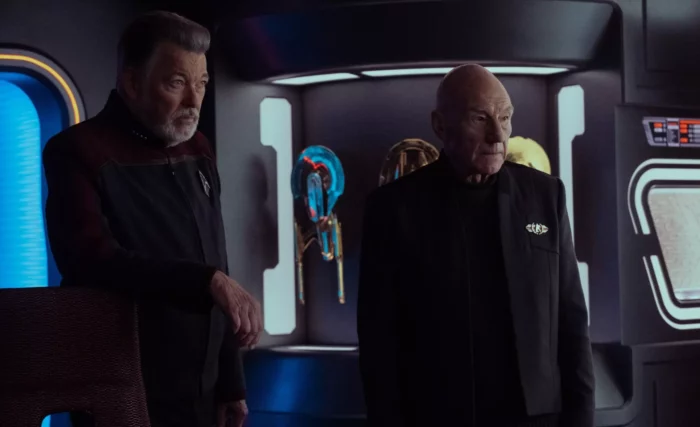In a weekly column called On the Box, author A. J. Black unpacks what we’re all discussing from the world of television. This time, he looks at the new series of Star Trek: Picard (Season 3) and the franchise’s ongoing problem with nostalgia…
Roughly 18 months ago, I wrote a piece on the trailer for the second season of Star Trek: Picard in which I hoped it might not wallow in the kind of fan-baiting nostalgia the appearance of legacy characters such as Q or Guinan might suggest.
Well, that hope wasn’t entirely met, in the end. If the first season reintroduced Jean-Luc Picard as the lonely inhabitant of a near-dystopian Trek future, the second year signalled a turning point as Star Trek: Picard, under Akiva Goldsman & Terry Matalas rather than Michael Chabon, began to turn back rather than press forward, as had been Sir Patrick Stewart’s desire in returning as the iconic Enterprise Captain. Season 2 revived old favourite characters, played on old favourite movie The Voyage Home, and indulged The Next Generation’s ultimate villain in the Borg Queen.
The result was a muddled morass of time travel plotting fused with a needless revelation of childhood trauma around Picard (never before even hinted at over the last 30+ years), which saw the show swim into the mawkish, sub-Doctor Who fantasy storytelling that Star Trek: Discovery peddles season upon season. Even the presence of great old hands like John de Lancie and Whoopi Goldberg couldn’t save it as the show steadily began to place Picard further and further back into The Next Generation’s nostalgic past, steadily sidelining the new ensemble around him and eroding any sense this wasn’t the Star Trek universe we knew from the 1990s.

Little did we know this was a mere hors d’oeuvre, a soupçon if you’ll allow me to keep using French parlance, for the nostalgic onslaught of the third and final season of Star Trek: Picard. Matalas now fully in charge, the season was heavily billed ahead of time as being the final journey of The Next Generation crew (they called Star Trek: Nemesis the same in 2002, but we don’t talk about that). All of the legacy characters not yet seen in Star Trek: Picard would return—Worf, Geordi, Beverly Crusher, even Brent Spiner despite Data being long dead. The gang all here, Picard could get back to being what fans wanted it to be all along—the revival season of The Next Generation.
Ironically, this is what Stewart had been pitched by all accounts again and again year after year since Nemesis and turned down, not wanting to simply play Picard as the man he was before, the taciturn commander of the Federation flagship. To his credit, this was a canny move; you couldn’t make TNG straight up these days, not simply given how much television has changed but what audiences themselves have come to expect. TNG’s slow sense of futuristic earnestness, sailing around in a calm, unipolar future, would never fit the 2010s or especially the 2020s, arguably the two most unstable decades since Star Trek was first revived after cancellation in 1979.
Playing Picard as an emeritus figure, his Captain days long behind him, was always the correct move. As is almost always the case with legacy show revivals, the elder actors never quite gel with their iconic characters in the same way as people remember (see Gillian Anderson as The X-Files‘ Dana Scully, circa 2016) and Stewart has been no exception, but he finally does seem at home in the third season as Picard is very quickly surrounded by the characters he works the best opposite—a grumpier Will Riker (Jonathan Frakes), himself bored of semi-retirement and domesticity, and to an extent Beverly (Gates McFadden), although she’s basically an entirely new character now, re-conceptualised as a gun-toting frontier doctor with a Han Solo-esque son.
Should this have been what Star Trek: Picard was from the beginning? There is an argument for that. Season 3 is easily both the most fun and adeptly written of the show so far, even if it once again is driven primarily by plot function than any sense of meaningful character work. It becomes clear just how less successfully Picard as a character works without that crew around him, in a manner William Shatner or especially Leonard Nimoy as Kirk and Spock respectfully never faced. The absence of the majority of the original Picard cast—a couple dead, a couple simply cast aside for being dull as ditchwater—speaks volumes as to how Star Trek: Picard has both jolted to life and become utterly swamped by the nostalgia Stewart initially wanted to avoid.

I’ve talked at length in several quarters about how big a problem this generally is with Star Trek currently. The 1990s era absolutely dabbled in bringing back legacy characters and storylines or basking in the glow of The Original Series, with episodes such as Deep Space Nine’s “Trials and Tribble-ations” or Voyager’s “Flashback.” Both of these, however, were designed around Trek’s 30th anniversary, as special celebratory events. These days we get a “Trials and Tribble-ations,” certainly in nostalgic intent, every single week. The Alex Kurtzman-led era of Trek is pathologically obsessed with eating its own tail, of reconstituting what fans loved about the series and movies of old, and Season 3 of Star Trek: Picard is perhaps the most gratuitous run of episodes yet in that regard.
The apogee of this is the sixth episode of the series, which in nostalgic terms has to be seen to be believed. Not only do we see the reappearance of about three legacy characters (one of whom is brief and utterly perfunctory, despite being trailed heavily as a major villain), but we visit a place which is essentially the equivalent of a maritime museum for the Star Trek world, festooned with nods and call backs. It is overwhelming. Even the season premiere, “The Next Generation” (geddit?), doubles down on evoking The Wrath of Khan around the reveal of the U.S.S. Titan, a ‘neo-Constitution’ starship with the same design and aesthetic as TWOK’s U.S.S. Reliant (with a bit of Discovery thrown in, which ironically was also influenced by TWOK). We get a space dock scene which has identical dialogue to TWOK, with uses of similar music from Stephen Barton. Even the opening caption ‘In the 25th Century…’ is a direct TWOK rip off, down to the same font!
In some ways, this is bizarre for Star Trek: Picard, this attempt to evoke The Original Series aesthetic and cinematic legacy. The Next Generation had entirely its own style and substance but Star Trek: Picard doesn’t seem remotely interested in mining that, even with this being the crew’s final collective voyage. We get a bit of the First Contact theme in the credits, sure, but where are the stylistic storytelling nods to that film, or Generations, or Insurrection, let alone the TV series. Star Trek: Picard, like Discovery, like animated teen-orientated series Prodigy, like Strange New Worlds, is all channeled through this nostalgic haze for the 1960s that Trek has been consumed by since the J.J. Abrams 2009 reboot movie. Only older-skewing animated series Lower Decks truly seems to understand how to play 1990s Trek nostalgia while having its own sense of identity, hence why it remains the only truly decent, consistent show of this era.
On a production level, I understand why Star Trek is where it is in this regard. Iconographically, The Original Series has the kind of swaggering, fun adventure style that the ’90s series eschewed often for scientific rigour or detailed character work. That’s not how modern TV with this kind of pulp sensibility operates. All of modern Trek feels like those bananas Mirror Universe episodes of DS9 where plot and character would bounce around like an overeager pet; entertaining but empty in comparison to most of the storytelling around them. Kurtzman and his ilk either don’t have the talent or bravery to truly make Star Trek: Picard the kind of meditative TNG legacy series that would do justice to the show itself, so it’s now this kind of Happy Meal, disposable Trek bunch of calories that simply mine how much you enjoyed the past, even while it looks nothing like it.

Maybe that’s what nostalgia is now, generally. Remembering a past that never quite existed as you think it did. Many fans won’t, and don’t, care. Many want Star Trek to keep doing this and, dash it all, even I found Star Trek: Picard Season 3 thoroughly entertaining. It made me laugh; it at points thrilled me. It was fantastic to see actors like Frakes and Michael Dorn not miss a step slotting back into these roles. I was entranced too. But I also have a sense of awareness that Trek can’t do this forever and if it does, it will destroy itself one day. Like most legacy franchise storytelling, the lack of identity, the obsession with evoking past glories, will mean a complete absence of staying power in the way those earlier series have provided.
The only character in Star Trek: Picard Season 3 who truly understands this is Captain Luke Shaw, excellently played by Todd Stashwick, and we are meant to hate him. He’s the guy who holds no truck with these legends repeating past glories. He even admits he’s an arsehole by default later in the series, as the writing inevitably works to humanise him. Ultimately, he’s right. I don’t want a Captain Shaw show, but I do want a Star Trek that dares to be something we haven’t seen before, with new actors, and the sense of boldly going where no one has gone before again. All Trek does is now is gamely revisit where it’s been before many times. It’s space, the well-trod frontier.
You’ll enjoy Star Trek: Picard if you’re a Star Trek fan happy to give in to nostalgia. It is well produced nostalgia. But that’s all. And that’s not really enough.

